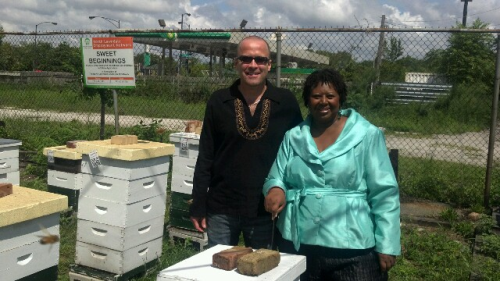Jun 11, 2013
Social enterprise: New kid on the block
Social enterprise: New kid on the block
CHICAGO — DePaul University business students are leading the push to learn more about social ventures, which compete in business while also generating clear and measurable contributions to society.
Patrick J. Murphy, an associate professor in DePaul’s Kellstadt Graduate School of Business in the 100-year-old Driehaus College of Business, is connecting DePaul students with the large and growing population of socially purposeful ventures in Chicago to the benefit of both.
“Traditional businesses are seeing that companies that engage and give back to their communities on a deeper, more meaningful level are more competitive and profitable in the long term,” said Daniel Speers, one of Murphy’s students.
DePaul MBA student Kristine Rellihen agreed. “It is my belief, that in time, all traditional entrepreneurship will be social entrepreneurship. It is becoming more and more apparent that organizations that do not incorporate social value in their portfolio diminish their long-term viability.”
Murphy said social ventures differ from more traditional ones in terms of how they denominate value. The firm boundaries are also more opaque, he noted.
“What is a customer and what is an employee are not such simple questions. The lines can blur in operating social ventures,” he said. “We think of social venture viability in terms of the mobilization of a constituency and in terms of how to serve a need. It forces one to think a bit more deeply about revenues and costs, and the business models tend to be a bit more complex.
Murphy developed a new Social Entrepreneurship MBA class in 2009 after he led an outreach consulting trip to New Orleans, where a team of DePaul MBA students worked with Naked Pizza and won a venture consulting competition. Today, there is a Naked Pizza location in Chicago co-managed by a DePaul MBA alumnus.
Within a year, interest exceeded the boundaries of the new MBA class. The course was a hit with DePaul business and public service graduate students, but there also was interest from students in other disciplines, including liberal arts and social sciences and computing and digital media. Murphy realized something more was needed.
In fall 2012, he launched the Social Enterprise Collaborative, which connects students with socially purposeful enterprises in Chicago. DePaul students in the initiative provide outreach consulting to Chicago social ventures, find internships, come together for networking, and learn about unique business models that generate social value while also generating enough revenue to cover costs.
Their growing portfolio
Students in Murphy’s Social Entrepreneurship MBA class and in the Social Enterprise Collaborative are serving a growing number of social ventures in Chicago.
Some examples include:
• Devising a venture plan for the textile designs of the indigenous Shipibo tribe in Peru. The Field Museum of Natural History needed an alternative revenue source for the tribe so they wouldn’t be reliant on money from illegal logging companies that are cutting down the rainforest of Cordillera Azul National Park in the Amazon region of northern Peru.
• Establishing a communications protocol for Sweet Beginnings LLC to help coordinate the expansion of honey-based Beeline products into the Hudson stores in Chicago’s O’Hare International and Midway Airports. The North Lawndale venture produces premium honey in urban apiaries as part of a transitional jobs program that provides formerly incarcerated individuals with green-collar jobs.
• Creating engaging workshops and developing steps and metrics for Cibola, a social enterprise innovation center and accelerator program for social and technology ventures that serves the entrepreneurial community in Chicago’s Pilsen neighborhood.
A good fit for Chicago and DePaul students
Social entrepreneurship appeals to DePaul students who are looking for a more purpose-driven business career.
Rellihen, who worked on the Shipibo project, spent about six years working in advertising before realizing she wanted more social impact in her career path. She enrolled in DePaul’s MBA program with a concentration in sustainability management and was first introduced to social entrepreneurship in Murphy’s MBA class.
“The class showed me that social entrepreneurship is a very viable career path. You can do well by doing good. You always hear to follow your passions, do what you love and it won’t feel like work. And for me, this class really shined a light on that option,” she said.
Other students said it gives meaning to their hard work and makes it worthwhile and rewarding.
“The intrinsic reward associated with improving the lives of others, for me, is immensely more motivating than financial compensation alone,” said Speers, who worked on the Shipibo project. “I came to DePaul specifically with the intention of using business to improve society.”
Paula Yanosy worked on the Sweet Beginnings project as part of an internship through Murphy’s Social Enterprise Collaborative. “I always try to volunteer in my spare time, and I thought why not use what I am learning in business school to help a company that is helping others? Why can’t businesses generate profit while also positively impacting other people and communities?” she asked.
Murphy said it’s a great fit for DePaul.
“DePaul’s culture is germane to helping others and connecting with Chicago communities. Integrating social purpose into business in a meaningful way is very natural at DePaul,” he said. “Part of the purpose is to help Chicago social ventures, but our students are the ones who really benefit.
“For a management professor, it’s an amazing area of study. In some ways, the students are ahead of us,” Murphy said. “This traditional tradeoff between ‘doing well’ and ‘doing good’ does not color their perception. They see no good reason why one can’t or shouldn’t do both at the same time.”

Patrick J. Murphy and Brenda Palms Barber, owner of Sweet Beginnings LLC. A DePaul student established a communications protocol and helped smooth plans to expand at O'Hare International Airport for Sweet Beginnings, which produces premium honey products in urban apiaries as part of a transitional jobs program that provides formerly incarcerated individuals with green-collar jobs.
